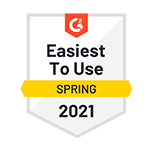It’s a common misconception that small businesses do not need an ATS. The recruitment process is critical for any business, regardless of its size. However, small recruitment agencies often have limited resources and staff, making it challenging to manage the hiring process efficiently. This is where an Applicant Tracking System (ATS) can be a game-changer. An ATS can automate many administrative tasks, saving time and reducing costs. It can also help small recruitment agencies to attract high-quality candidates, improve data management, and enhance collaboration. In this blog, we will discuss the benefits of an ATS for small recruitment agencies and provide insights on how to choose the right one for your business.
What is an ATS for Small Recruitment Agencies?
An Applicant Tracking System (ATS) is a software solution that streamlines the recruitment process by automating administrative tasks, managing resumes, and tracking candidate progress. An ATS is a tool that can help small businesses manage recruitment, hiring, and onboarding more efficiently. Here are some common features of an ATS:
- Resume Parsing: An ATS can automatically parse resumes and extract key information such as name, contact details, work experience, and education.
- Candidate Database: An ATS can store candidate information and enable easy access to resumes and other relevant documents.
- Job Posting: An ATS can help small businesses create and publish job postings to various job boards, social media platforms, and company career pages.
- Applicant Communication: An ATS can automate candidate communication and provide status updates on their application progress.
- Interview Scheduling: An ATS can help schedule interviews and send out reminders to both candidates and interviewers.
- Collaborative Hiring: An ATS can enable easy collaboration among team members, recruiters, and hiring managers.
- Reporting and Analytics: An ATS can provide valuable insights into the recruitment process by tracking metrics such as time-to-hire, source of hire, and candidate engagement.
These features can help small businesses streamline their recruitment process and improve the overall candidate experience. In the next section, we will discuss the benefits of an ATS for small recruitment agencies.
Why Does a Small Company Need an Applicant Tracking System?
Small companies are an essential part of the economy, and they face unique challenges when it comes to recruiting top talent. Small companies often have limited resources and staff, making it challenging to manage the hiring process efficiently. However, an Applicant Tracking System (ATS) can be a game-changer for small businesses. Here are some reasons why small companies need an ATS:
- Save Time and Money: Small companies often have to work within a tight budget and limited resources. An ATS can automate many of the administrative tasks associated with the hiring process, reducing the need for manual work and saving time and money. It can help small businesses streamline their recruitment process, improve efficiency, and reduce costs.
- Improve Candidate Experience: An ATS can provide a more streamlined and efficient recruitment process, which can improve the overall candidate experience. Small businesses can use this advantage to attract high-quality candidates, even in a competitive job market. An ATS can also help small businesses to create a positive employer brand, making them more attractive to potential employees.
- Enhance Data Management: Small businesses often struggle to keep track of applicant information, including resumes and interview notes. An ATS can store all applicant information in one central location, making it easier to manage and access. This can also help with compliance, as it ensures that all candidate information is stored securely and meets legal requirements.
- Collaborative Hiring: Small businesses often have a small HR team, which can make it challenging to collaborate on the hiring process. An ATS can help to centralize communication and ensure everyone is on the same page. It can also enable easy collaboration with external stakeholders, such as hiring managers and recruiters.
- Improve Hiring Decisions: An ATS can help small businesses make data-driven hiring decisions. It can provide valuable insights into the recruitment process by tracking metrics such as time-to-hire, source of hire, and candidate engagement. This information can be used to identify areas for improvement and make better hiring decisions.
- Easy Scalability: Small businesses often experience growth, which can lead to an increase in recruitment needs. An ATS can help small businesses to scale up their recruitment efforts without sacrificing efficiency or quality.
An ATS can be a valuable tool for small businesses looking to streamline their recruitment process and attract high-quality candidates. Small businesses that implement an ATS can gain a competitive advantage in the job market, making it a worthwhile investment for any small company looking to grow and succeed.
Can ATS be cost-effective for small businesses?
When it comes to investing in technology, small businesses often have to be mindful of their budget. Applicant Tracking Systems (ATS) are no exception, and many small businesses may wonder if the cost of implementing an ATS is worth it. While there is no one-size-fits-all answer to this question, there are a few key factors to consider.
Firstly, it’s important to remember that an ATS can save small businesses time and money in the long run. By automating many of the administrative tasks associated with the hiring process, an ATS can reduce the need for manual work, improving efficiency and reducing costs. This can be especially beneficial for small businesses that have limited staff and resources to dedicate to recruitment.
Secondly, the cost of an ATS can vary depending on the size and complexity of the system. Many ATS providers offer different pricing plans, with options for small businesses with fewer recruitment needs. Some ATS providers may even offer a free trial, allowing small businesses to test the system before committing to a purchase.
Another factor to consider is the potential return on investment (ROI) of implementing an ATS. By improving the recruitment process and attracting high-quality candidates, small businesses can experience significant benefits, such as reduced turnover rates and improved productivity. These benefits can far outweigh the initial cost of implementing an ATS.
Overall, while an ATS may represent an initial investment for small businesses, it has the potential to save time, reduce costs, and improve recruitment outcomes. It’s important for small businesses to carefully consider their needs, budget, and potential ROI when deciding whether to implement an ATS.
Can ATS customized workflow for small businesses?
Many Applicant Tracking Systems (ATS) offer the ability to customize workflows to meet the specific needs of small businesses. This can be especially important for small businesses, as they may have unique recruitment requirements that may not be met by a standard ATS workflow.
Customizing an ATS workflow can involve tailoring the recruitment process to fit a specific job role or department, or adding new stages to the recruitment process. For example, small businesses may need to include additional background checks or assessments as part of the hiring process. By customizing the ATS workflow, these additional requirements can be seamlessly integrated into the recruitment process, making it more efficient and streamlined.
Another way an ATS can be customized for small businesses is through branding. An ATS can be branded to match the company’s visual identity, creating a more personalized and professional candidate experience. This can help small businesses to create a positive employer brand and stand out from other companies in the job market.
Customization can also involve integrating an ATS with other recruitment tools or software. For example, an ATS can be integrated with job boards or social media platforms, allowing small businesses to reach a wider pool of candidates. Integration with other HR tools, such as payroll software or performance management systems, can also help small businesses to manage the entire employee lifecycle more efficiently.
An ATS can be customized to meet the specific needs of small businesses. This can involve tailoring the recruitment process, branding, and integration with other recruitment tools and software. By customizing an ATS, small businesses can create a more efficient and personalized recruitment process, which can help to attract high-quality candidates and improve the overall hiring outcomes.
ATS can increase the Productivity
Applicant Tracking Systems (ATS) can have a significant impact on the productivity of small businesses. By automating many of the administrative tasks associated with the recruitment process, an ATS can save time and increase efficiency, allowing small businesses to focus on other important areas of their business.
One way that an ATS can increase productivity is by reducing the time and resources required for manual recruitment tasks, such as resume screening and scheduling interviews. By automating these processes, small businesses can save time and reduce the risk of errors or delays.
In addition, an ATS can also improve the quality of candidates being recruited. By leveraging features such as keyword matching and pre-screening questions, an ATS can identify the most qualified candidates for a role, allowing small businesses to focus their efforts on the most promising candidates. This can help to reduce the time and resources required for the recruitment process, as well as improving the overall quality of candidates being hired.
Furthermore, an ATS can also help small businesses to create a more efficient and streamlined recruitment process. By centralizing all recruitment data and communication in one place, an ATS can improve communication and collaboration between hiring managers and recruiters, reducing the risk of miscommunication or duplication of effort.
Overall, an ATS can be a valuable tool for small businesses looking to improve their productivity and efficiency in the recruitment process. By automating administrative tasks, improving candidate quality, and streamlining communication and collaboration, an ATS can help small businesses to save time, reduce costs, and improve hiring outcomes.
How to Choose the best Applicant Tracking System
Choosing an Applicant Tracking System (ATS) can be a daunting task, especially for small businesses that may not have a dedicated HR department or specialized personnel. However, selecting the right ATS can significantly improve the efficiency of recruitment processes and save valuable time and resources. Here are some factors that small businesses should consider when choosing an ATS.
- Understand your business needs
Before investing in an ATS, it’s essential to understand the specific recruitment requirements of your small business. Consider factors such as the size of your business, the number of job openings, and the number of employees involved in the recruitment process. You should also consider the type of job roles you are recruiting for and the recruitment channels you will use. By understanding your business needs, you can select an ATS that offers the features and functionality that will help your business achieve its recruitment goals.
- Don’t assume the most popular or most feature-packed option is the best
While the most popular or most feature-packed ATS may seem like the obvious choice, it’s essential to evaluate the features and functionality of each ATS and compare them to your business needs. Consider whether the features and functionality of the ATS will help your business achieve its recruitment goals, or whether they will be an unnecessary expense.
- Use free trials
Most ATS providers offer free trials, allowing you to test the software before making a purchase. Evaluating the ATS through a free trial is a great way to ensure it meets your business needs. Test it on all recruitment processes, such as job posting, resume screening, interview scheduling, and offer management.
- Evaluate security features
Data security is crucial for ATS as it stores sensitive information about candidates and employees. Check the security features of the ATS and ensure it meets your data security requirements. Look for encryption, two-factor authentication, and data backups. Also, evaluate the ATS’s compliance with data protection regulations like GDPR.
- Check the user interface
An ATS should be easy to use and navigate, especially for small businesses that may not have dedicated HR personnel. The user interface should be intuitive and straightforward, and the software should be customizable to meet your business needs.
Choosing the right ATS for your small business requires understanding your recruitment needs, evaluating the features and functionality of each ATS, and testing the software before purchasing. It’s also important to consider the security features and user interface when making a decision. By doing so, you can improve the efficiency of your recruitment process and save valuable time and resources.
Choosing the Best Software for small recruiting agencies
For small recruitment agencies, there are many software options to choose from. However, one software that stands out is RecruitBPM.
- User-Friendly Interface: RecruitBPM’s interface is user-friendly for small recruitment agencies. Its dashboard provides a quick overview of the recruitment process and progress tracking.
- Customizable Features: RecruitBPM allows small recruitment agencies to customize the software to suit their specific needs. It has features like custom fields and workflows, which can be tailored to match the agency’s recruitment process.
- Affordable Pricing: RecruitBPM offers affordable pricing plans that cater to the needs of small recruitment agencies. The pricing plans are flexible and scalable, meaning agencies can upgrade or downgrade their plan as needed.
- Integration with Other Tools: RecruitBPM integrates with job boards, social media, and email clients. This helps small agencies expand their reach and streamline their recruitment process.
- Advanced Reporting: RecruitBPM has advanced reporting features that enable small agencies to track and analyze their recruitment process. The software generates reports on metrics like time-to-hire, cost-per-hire, and source-of-hire, among others.
RecruitBPM vs. Other Software
Vultus
Vultus offers features such as resume parsing and job posting. RecruitBPM has an advantage in usability and affordability. RecruitBPM’s intuitive interface and simple setup process make it an ideal option for small businesses. Additionally, RecruitBPM offers flexible pricing plans that can fit within the budget of small recruitment agencies.
Ceipal
Ceipal is a comprehensive ATS that offers features like resume parsing, onboarding, and performance management. However, Ceipal’s complexity and high pricing can be a drawback for small businesses. In contrast, RecruitBPM offers a simple and user-friendly interface that requires minimal training and onboarding. Moreover, RecruitBPM’s pricing plans are cost-effective, making it a better choice for small businesses.
Smart Recruiters
Smart Recruiters is a cloud-based ATS that offers features like job posting, candidate management, and custom reporting. However, Smart Recruiters’ high pricing and lack of flexibility can be a disadvantage for small businesses. RecruitBPM offers a more affordable and customizable solution that can be tailored to the specific needs of small recruitment agencies. Additionally, RecruitBPM’s easy setup and user-friendly interface make it an ideal option for small businesses.
Talent Square
Talent Square is a recruitment software that offers features like job posting, candidate management, and custom reporting. However, Talent Square’s limited functionality and lack of flexibility can be a drawback for small businesses. RecruitBPM offers a more comprehensive and customizable solution that can meet the diverse needs of small recruitment agencies. Additionally, RecruitBPM’s affordability and user-friendly interface make it a better option for small businesses.
Tracker RMS
Tracker RMS is an ATS that offers features like job posting, candidate management, and custom reporting. However, Tracker RMS’s complexity and high pricing can be a disadvantage for small businesses. RecruitBPM is a cost-effective solution for small recruitment agencies. It is customizable to meet their specific needs. Moreover, RecruitBPM’s user-friendly interface and flexible pricing plans make it a better choice for small businesses.
RecruitBPM has an edge over other software options. RecruitBPM is more affordable, usable, and flexible. Other software options include Vultus, Ceipal, Smart Recruiters, Talent Square, and Tracker RMS. RecruitBPM offers a comprehensive and customizable solution. RecruitBPM can meet the diverse needs of small recruitment agencies.






















